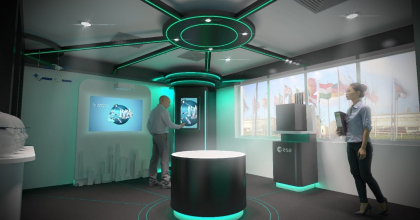
The European Space Agency (ESA) has launched a new partnership with an industrial consortium through a project called Smart-Connect, which aims to mitigate the challenges presented when existing telecommunication channels are disrupted during times of crisis – such as during wildfires and flooding.
Smart-Connect will facilitate the efficient and timely exchange of secure information between first responders and disaster control centres, giving decision makers the data they need to respond quickly and more effectively. The project brings together an international team of multi-disciplinary expertise from the fields of Earth observation (EO), telecommunication, big data management, artificial intelligence (AI) for data management, Internet of Things (IoT) and new space with hyperspectral sensing.
The European collection of companies will develop a ‘multi-channel data dispatcher’ that will provide seamless ultra-low latency telecommunication solutions for Earth observation information products, allowing emergency managers to connect to local ground stations. This will ensure vital support when traditional means of communication are not able to transmit the required volumes of data.
Led by Austria-based GeoVille, who are developing middleware and integration of the specialised data layer, the industry partners will draw on space applications that will be combined with space and ground data. The remaining eight companies from six ESA Member States each bring their own expertise:
- Geospatial data analytics that transforms collected data into actionable insights, provided by Sistema in Austria.
- Artificial intelligence-based data compression and de-compression technology, through Vito in Belgium.
- On-board computing software that boosts data processing, provided by Klepsydra in Switzerland.
- Interface functions between the multi-channel data dispatcher and the clients and service providers by Nexat in Belgium.
- Video surveillance for early automatic detection and operational decision support in forest fires, provided by INOV in Portugal.
- Real-time indoor and outdoor location and IoT services, through Epic Blue in Belgium.
- Near real-time Earth observation insights through an extensive hyperspectral satellite constellation combined with advanced artificial intelligence, provided by Kuva Space in Finland.
The value of this system is planned to be showcased across Europe, with the development of use cases underway, including support to maritime security in Belgium and Finland, wildfire management in Portugal, and extreme weather management in Austria.
“The project is truly cross-disciplinary across ESA, bringing EO, navigation and satcom together into the next generation of information services. In particular, it will address one of the major challenges during disaster, the lack of bandwidth to connect rapid responders between them and also with the right information. By capitalising on state-of-the-art satcom and sophisticated software, the project will define a kind of "local" ground stations enabling ultra-low latency access to geospatial and drone information. The beginning of end-to-end satcom, from space to people in the field,” said Javier Benedicto, Acting Director of ESA's Connectivity and Secure Communications.
“The use of EO during disasters is critical to gain situational awareness. One of the challenges is to deliver the right actionable information to the rapid responders in the field. This project will help in “bridging the last mile” by capitalising on the latest development in satcom, AI, IoT and new space. The convergence of all these technologies will help extract so much more value from EO data for disaster management and will also open a new market for low latency products,” said Simonetta Cheli, Director of ESA's Earth Observation programme.
Smart-Connect is part of ESA’s Civil Security from Space (CSS), a programme within the Directorate of Connectivity and Secure Communications that offers European industry the opportunity to maximise the use of space capabilities to address challenges in civil security and crisis management. CSS feeds into the Rapid and Resilient Crisis Response (R3) accelerator, one of three accelerators that aim to provide new ways of cooperation and action that lead the way to a more accessible, open and user-driven space sector.




